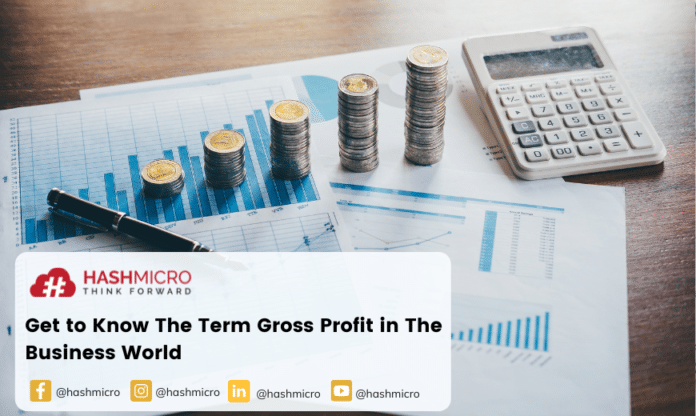Gross Profit is one of the most important indicators for a company. In accounting economics, profit is also called profit. In the book Financial Statement Analysis: Basic Concepts and Description of Financial Statements (2019), profit is the difference between income and expenses. So companies can use the profit calculation to measure expenses (costs) and income.
Usually, the term profit is often found in the business world, especially in the accounting field. because profit is very closely related to a business, business owners must understand well what profit is and how to cultivate it.
So in this article, we will discuss gross profit, which is quite different from net profit. Knowing the purpose and discussing how to calculate it. Check out the following article for more detailed information.
Table of Content:
Table of Content
What is Gross Profit?
Gross profit or return on sales is the profit a business generates after deducting the costs associated with making and selling its products or costs associated with providing services. The calculation is by deducting the cost of products sold from revenue on the company’s income statement (sales). The income statement contains this calculation. The size of the gross profit can affect the company’s follow-up on what to do in the coming period.
Gross profit measures how efficiently a business uses labor and inventory to produce goods or services. This calculation considers variable costs that vary with output, such as; raw materials, labor, sales commissions, credit card costs for customer purchases, equipment, including depreciation on use, utilities for production sites, and shipping. In general, gross profit does not include fixed assets, i.e. costs that must be paid regardless of output level. Fixed assets include rent, advertising, insurance, salaries of employees not directly involved in the production and office supplies.
There are at least three factors that affect GP, namely:
- Changes in selling price
affect the amount of profit earned by the company. If the selling price is higher, the company’s profit will increase. Differences in selling prices in different periods will impact changes in profit earned.
- Changes in the number of products sold
also affect profit. For example, the more goods sold, the company’s profits will automatically increase. Like changes in selling prices, changes in product quantity can also change profits.
- Product
sold-goods price Raw material prices, salaries, and price hikes all have a significant impact on the cost of items. If the cost of goods sold changes, but the selling price remains the same, the company’s profit will also change.
Purpose of Calculating
Knowing gross income is important for the business accounting process because it is specifically related to the cost of goods sold. In other words, the resulting data can reflect the effectiveness of the company’s management in terms of purchasing inventory. In addition, it can help companies allocate labor or make decisions about factories or production locations of goods.
The gross margin varies widely across products and industries and is typically used to measure the profitability of a single business product. This shows the efficiency in which the company uses the resources provided to produce goods or services. If a company has multiple projects or multiple products, report on each project separately.
Differences in Gross Profit and Net Profit
In business, gross profit is usually calculated at the end of the period. It generates the company’s revenue from product sales for the period. The sales proceeds will then cover operational costs, such as administrative costs, production costs, and marketing costs.
In contrast to net profit, which is the residual income from gross profit, when all income has been allocated to pay production costs, wages, interest and taxes, the remainder is a net profit. Usually, the calculation is gross profit minus all operating expenses.
How to Calculate It
Before calculating net income, the first thing is to calculate is the amount of gross profit in the specified period.
The formula for calculating GP is:
Gross Profit: Net Sales – Cost of Goods Sold
- Net Sales is the result of sales after deducting the costs required in sales activities: Sales – Distribution – Sales Returns – Sales Discounts
- Cost of Goods Sold are costs associated with manufactured goods that the company will sell to consumers: Beginning inventory + Net Purchases – Ending Inventories
- The entire cost of all purchases related to the production and sales process is known as net purchases: Purchases + Distribution – Purchase returns – Discounts Purchases
After obtaining the gross profit value, the amount or value of net profit for the provided period is compute.
The formula for calculating net income is:
Net Profit: Gross Profit – Operating Expenses Operating
Expenses: Operating Expenses + Non-Operating Expenses
1. Profit Before Tax, Interest, Depreciation Amortization (EBITDA): Interest Expense – Operating Expenses
2. Profit Before Tax and Interest: EBITDA – Depreciation Cost and Amortization of
3. Profit Before Tax (EBT): Interest Expense + Interest Income – EBIT
Conclusion
That’s a brief discussion of gross profit, from its meaning to how to calculate it. By reading the short article above, you should already know how profitable the business you are running is because the size of the gross profit can affect the company’s follow-up, about what you should do in the coming period.
If you have a company or business running, don’t forget to improve the effectiveness and efficiency of business operations in calculating finances. HashMicro provides software to automate cash flow management, financial statement creation, bank reconciliation, adjusting journals, invoice creation, and more with the best Accounting Software.

































